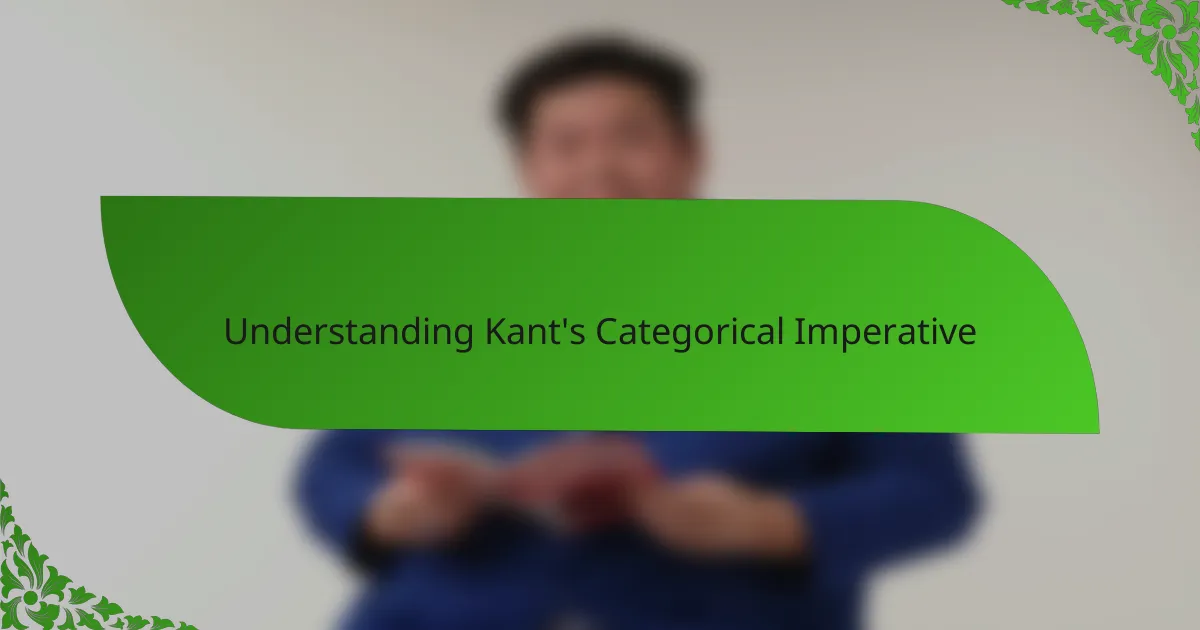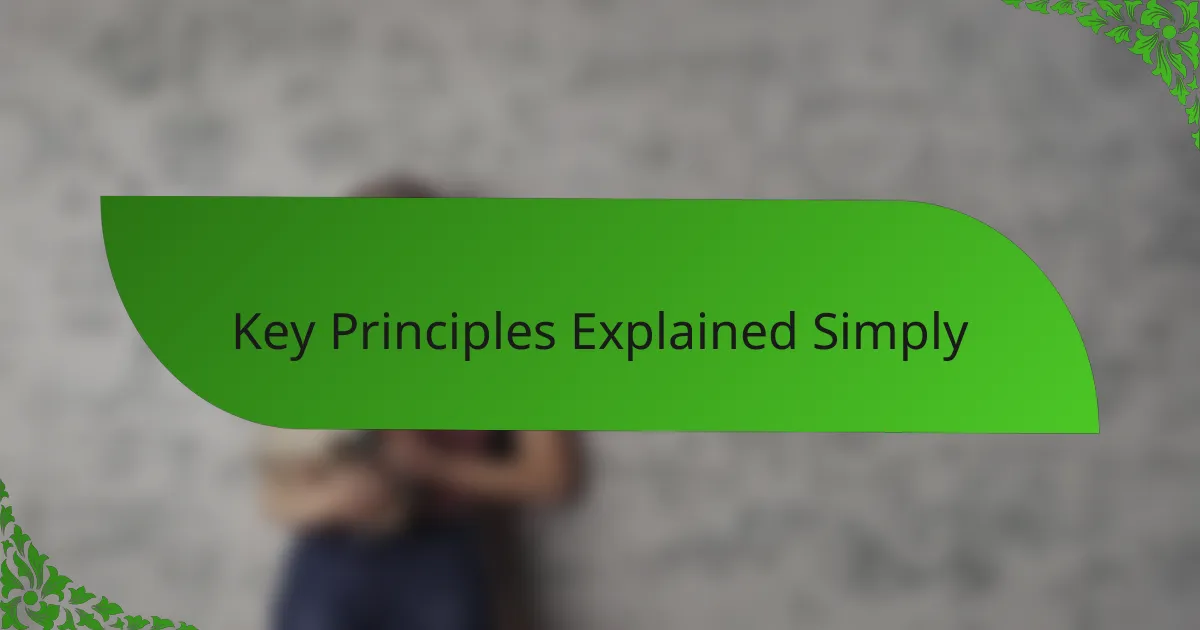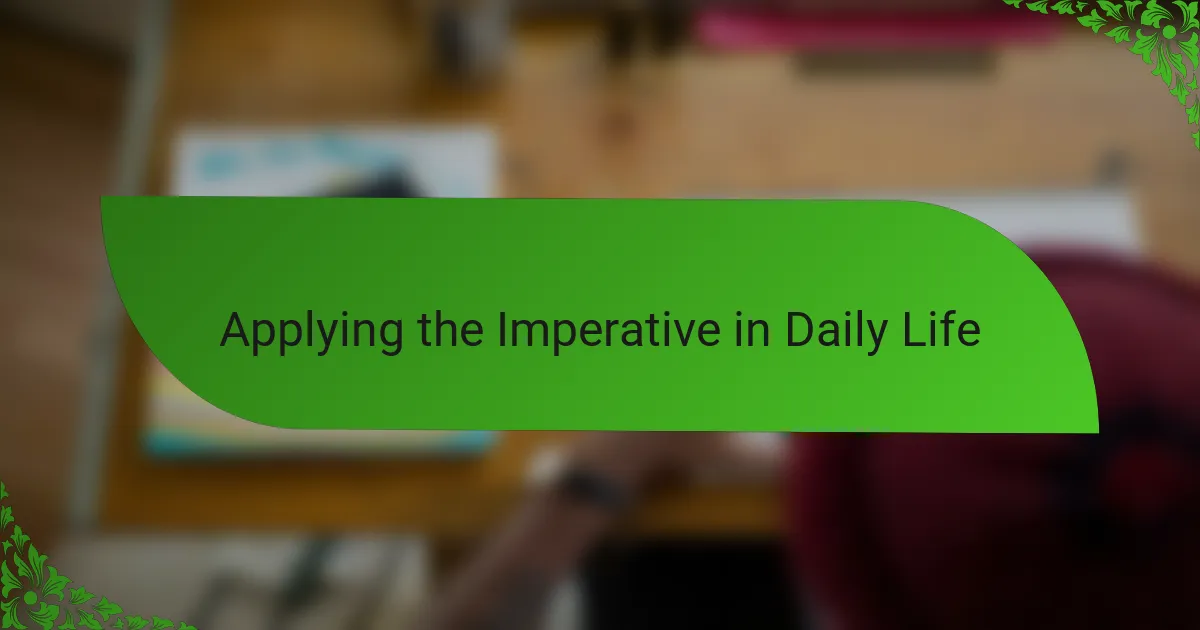Key takeaways
- Kant’s Categorical Imperative emphasizes acting on maxims that can be universally applied, focusing on intention over consequences.
- The principle encourages respect for others as ends in themselves, transforming personal interactions and promoting empathy.
- Applying the imperative involves confronting personal motivations and recognizing the importance of consistency in moral reasoning.
- Continuous reflection on one’s actions based on the Categorical Imperative fosters accountability and deepens one’s understanding of ethical responsibility.

Understanding Kant’s Categorical Imperative
Kant’s Categorical Imperative is a moral principle that asks us to act only according to maxims we can will to become universal laws. At first, I found this idea challenging—how could I be sure my personal rules could apply to everyone? But reflecting on everyday choices helped me see its power in guiding consistent and fair decisions.
One thing that struck me was the emphasis on duty rather than consequences. Unlike other ethical theories focusing on outcomes, Kant urges us to consider the intention behind our actions. This focus made me rethink moments when I acted selfishly but justified it by positive results; was I truly acting morally then?
Have you ever wondered what it means to respect others as ends in themselves, not merely as means? For me, this part of Kant’s philosophy transformed how I relate to people — it’s a call to honor their inherent worth, not just use them for my purposes. This shift felt deeply personal and prompted me to be more mindful in my interactions.

Importance in Philosophy Education
Philosophy education gains so much depth when we engage with Kant’s Categorical Imperative. I remember feeling a real shift in my thinking—this principle isn’t just abstract theory; it challenges us to develop moral reasoning that holds up universally. Isn’t that what education should do, push us beyond personal bias toward broader ethical clarity?
What I found especially valuable in studying Kant is how it cultivates critical self-reflection. When I asked myself, “Could my reason for acting be made a law everyone follows?” I confronted uncomfortable truths about my own motivations. Philosophy education thrives on this kind of honest questioning, which deepens our understanding of both ourselves and the world.
Moreover, the Categorical Imperative invites us to appreciate the intrinsic dignity of others. This was more than an intellectual exercise for me; it felt like a call to empathy and respect in daily life. In teaching philosophy, highlighting this aspect helps students connect moral theory to real human experiences, making learning both relevant and transformative.

Key Principles Explained Simply
Kant’s Categorical Imperative boils down to a simple yet profound test: would I want everyone to follow this rule? At first, it seemed abstract, but then I started applying it to everyday choices—like whether to keep a promise or tell a small lie—and it revealed a clear path toward honesty and consistency.
What I found striking is how this principle demands that actions be rooted in duty, not just convenience or outcomes. It made me pause and ask myself, “Am I doing this because it’s right, or because it benefits me?” That question alone reshaped how I weigh my decisions.
Another key idea is treating people as ends in themselves, not just tools. This felt deeply human to me; it’s more than moral jargon—it’s a personal challenge to honor the value in others every single day. Have you noticed how this mindset changes simple interactions, making them more respectful and meaningful?

Applying the Imperative in Daily Life
When I first tried applying Kant’s Categorical Imperative in daily life, I started with small decisions—like deciding whether to return extra change I was mistakenly given. Asking myself, “Could this be a universal rule?” made the choice clear, and honestly, it felt rewarding to act with integrity in that moment. Have you ever experienced that subtle but satisfying feeling of doing the right thing simply because it’s right?
I also noticed that applying the imperative challenged me during more complicated situations, like when helping a friend could mean sacrificing my own plans. The idea of duty over convenience pushed me to act out of respect for others, not just in ways that were easiest or most beneficial to me. It was a humbling reminder that morality isn’t about what feels good but what holds universally.
Sometimes, the hardest part was recognizing when I might be tempted to treat someone as a means to an end—say, asking for favors without considering their feelings. Kant’s emphasis on respecting the inherent worth of others made me more aware of these moments and more careful to act with genuine respect. Has this kind of reflection ever made you pause and rethink how you interact with others? For me, it’s been a powerful step toward more meaningful relationships.

Personal Experience with Implementation
I found that living by Kant’s Categorical Imperative wasn’t just a mental exercise—it shifted how I felt about my choices emotionally. For example, once I returned a miscalculated tip at a café, thinking, “Would I want everyone to do this?” That small act made me feel quietly proud, as if I’d contributed to a better standard of fairness in the world.
There were moments when applying this principle felt tough, especially in personal relationships. I remember hesitating before cancelling a meeting with a friend because I was tired, but reflecting on duty versus convenience reminded me that genuine respect means honoring commitments. It wasn’t always easy, but those moments taught me the real weight behind Kant’s idea of universalizability.
Have you ever caught yourself using someone just to get a favor? I certainly have. Recognizing that tendency was uncomfortable, but Kant’s call to treat others as ends pushed me to pause and genuinely consider their feelings. This shift deepened my interactions and helped me build trust in ways I hadn’t expected.

Challenges and Solutions
Applying Kant’s Categorical Imperative wasn’t without its hurdles. One challenge I faced was the temptation to rationalize exceptions for myself—thinking, “Maybe this one time it’s okay.” But that slippery slope quickly showed me how easily universality can collapse if we let ourselves off the hook. Have you ever found it hard to hold yourself to a consistent moral standard? I know I have, and that struggle made the principle feel all the more meaningful.
Another difficulty arose in balancing duty with empathy, especially when what seemed universally right didn’t feel kind or practical in the moment. For instance, turning down a favor that conflicted with my own plans tested my resolve. Yet, reflecting on the underlying respect for others helped me see that true morality isn’t cold; it’s about honoring dignity even when it’s challenging. This insight transformed how I approach tough decisions.
To overcome these challenges, I found it crucial to pause and ask myself genuinely, “Could this maxim be willed as universal law?” This simple question became a compass, helping me navigate morally complex situations with clarity. And when I slipped up, I reminded myself that consistent application is a practice, not perfection. Has embracing this mindset changed how you face ethical dilemmas? For me, it’s made the journey of moral growth feel more attainable and sincere.

Lessons Learned and Future Applications
Living by Kant’s Categorical Imperative has taught me that true moral clarity comes from unwavering consistency. I’ve learned to catch myself before making exceptions—those little “just this once” moments that can unravel the whole principle. Have you ever felt that tug between ease and integrity? For me, recognizing that tension has been crucial in growing both ethically and personally.
Looking ahead, I see the imperative as a daily guide, not a rigid rulebook. It challenges me to revisit my maxims regularly and ask, “Could this be a universal law?” Whether in work decisions or personal relationships, this question keeps me accountable and grounded. I wonder, does this kind of continual reflection also deepen your sense of responsibility over time?
Most importantly, practicing Kant’s principle has opened my eyes to how respect and duty intertwine in real life. I’m now more attentive to treating others as ends, especially when it requires effort or sacrifice. This ongoing challenge feels like a personal journey toward a more authentic, humane way of living—one I’m eager to continue exploring.